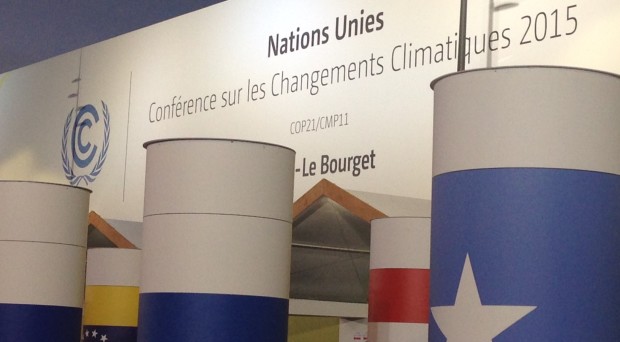
The first big United Nations (UN) climate meeting I went to was in Copenhagen in 2009. There was loads of fascinating stuff there, even though the outcome of that meeting was far from positive. But my lasting impression was that concerns for vanishing species in various exotic locations seemed more evident at that stage than potential threats to the health of Homo sapiens.
Six years on, some of the same people and some new ones have been in Paris over the last couple of weeks for COP21 (21st Conference of the Parties, to give the full title). As in all UN activities, the important constituency is UN Member States – represented by government delegations from all around the world – plus large numbers of people from technical, scientific and other organisations.
Right now there’s still hope that there will be a much more positive outcome in terms of agreement on how the world should move forward to limit future climate change – you will have to follow the mainstream media to see the final outcome.
Climate change and global health
As a global health specialist, why was I there in Paris? Unlike the Copenhagen era, there is now a much clearer consensus that health and climate change are inseparable issues. Part of the reason I went was to follow up on the Lancet Commission on Climate and Health, published a few months ago.
In that work, we concluded that, although climate change can definitely be detrimental to health, there are also significant possible win-win situations emerging. Let’s look at some examples in both directions.
Unlike the Copenhagen era, there is now a much clearer consensus that health and climate change are inseparable issues.
A brilliant presentation at COP21 from Al Gore, former US Vice-President, drew attention to the devastating rainfall in northwest England that actually occurred during the Paris meeting. That kind of rainfall is expected to be a very rare event – which might reasonably occur every 250 years or so in a particular area.
But if you remember back to 2009, there was a very similar rainfall event in that same area, which washed away ancient bridges. Bad luck? Coincidence? Once detailed analyses have been done, two “very rare” weather events in the same place within a few years will probably be seen as a clear manifestation of having more energy in the atmosphere. Sadly, lives were lost in both these 2009 and 2015 floods – so climate change can certainly be a public health threat.
Is there a positive side?
But on the other side, how might climate change bring public health benefits? As the world looks at ways of reducing greenhouse gas emissions, some of the important strategies and opportunities arise at the individual level.
Many people have a possible choice of walking or cycling as part of their daily journeys, rather than driving. Taking the choice to walk or cycle is an example of a so-called ‘climate and health co-benefit.
Many people have a possible choice of walking or cycling as part of their daily journeys, rather than driving. Taking the choice to walk or cycle is an example of a so-called ‘climate and health co-benefit’ – it helps the planet by reducing emissions and at the same time brings health benefits associated with exercise.
Another important example comes about as secure renewable energy supplies are brought to African and Asian communities – reducing the traditional burning of biomass fuels helps the planet, and the respiratory health of people who were often exposed to horrendous levels of indoor air pollution is safeguarded.
Sustainable global agreement
My take-away impression of COP21 is that the world has moved on to see that climate change is inexorably bound up with the provision of secure renewable energy and public health risks and benefits. Climate change, energy supplies and public health will continue to jostle each other in the coming decades.
Hopefully, if COP21 ends in a sensible and sustainable global agreement, the threats of uncontrolled climate change will be managed and thus make the planet a better and healthier place for future generations.
Comments